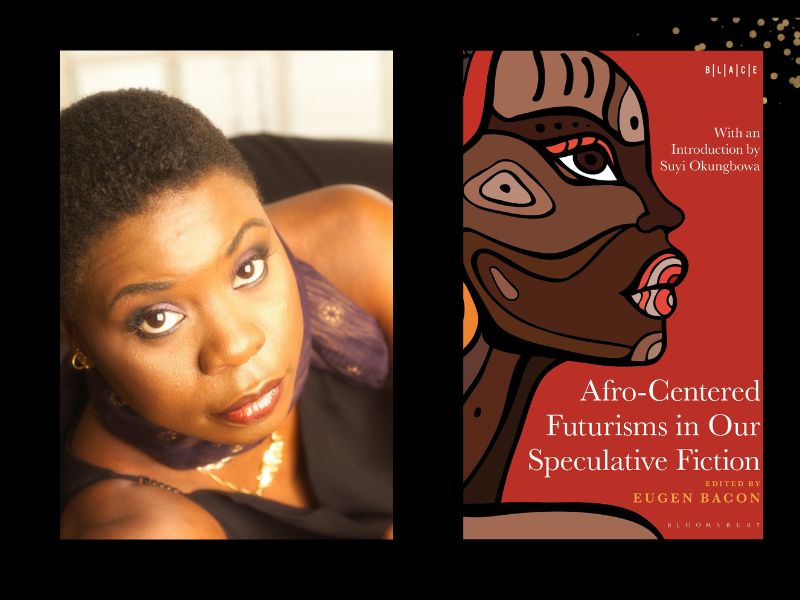Edited by Dr Eugen Bacon, the anthology Afro-Centered Futurisms in Our Speculative Fiction emerges as a significant scholarly contribution that delves into the intersection of African narratives and speculative fiction. With 11 well-crafted chapters contributed by a diverse array of authors, this anthology not only champions Afro-descendant voices, but also highlights the complexities and nuances of African experiences in the speculative genre.
Bacon, a Tanzanian-Australian author and computer scientist, sets the tone for this collection by promising a “voice from the grassroots” and “positioning that enwraps writerly perspectives from Afro-descendant peoples with lived experience from the continent”. This promise is fulfilled, to varying degrees, as the anthology seeks to preserve cultural heritage, counter historical biases and empower identities through academic engagement. The inclusion of Afro-descendant authors such as Suyi Okungbowa, Nuzo Onoh and Cheryl S Ntumy, adds depth and authenticity to the discourse.
However, the presence of three contributors of European descent raises critical questions about representation and authenticity within the context of South Africa’s complex historical landscape.
The anthology is admirable for documenting narratives that have traditionally been passed down orally, providing a more comprehensive understanding of global history that is often overshadowed by Eurocentric perspectives. This approach not only enriches the broader discourse on African experiences but also fosters interdisciplinary insights that are crucial for educational reforms aimed at reflecting diverse histories.
Each chapter offers a unique lens through which to interrogate Afro-centered narratives, with Okungbowa’s opening chapter addressing the implications of naming and labelling within the genre. His critique of mainstream representations, particularly those seen in popular media such as Marvel’s Black Panther, underscores the need for narratives that genuinely originate from the African continent. While the film has been celebrated as a groundbreaking work of Afro-futurism, offering a powerful platform for Black individuals to reimagine their histories and envision a liberated future, it simultaneously reveals deep-seated issues.
As highlighted, he states, “Black Panther was conceived by white creators, Stan Lee and Jack Kirby”, which raises questions about the authenticity and ownership of African narratives. This theme resonates throughout the anthology, as many authors grapple with the duality of celebrating African heritage while also confronting the colonial legacies that persist in narratives surrounding Afro-descendant peoples.
Cheryl S Ntumy’s Chapter Six stands out as a pivotal exploration of the distinction between Afro-futurism and African futurism, emphasising her preference for the latter as it more authentically represents African experiences and spirituality. She argues that African futurism, rooted in African culture and spirituality, offers a more authentic representation of the continent’s diverse experiences. Drawing on her works, including her short story ‘Godmother’ and the series ‘The Chronicles of the Countless Clans’, Ntumy argues that African futurism is deeply rooted in African culture, history and community, contrasting with Afro-futurism, which she views as a construct primarily aimed at a Western audience.
She highlights how African spirituality, characterised by a blend of the physical and spiritual realms, informs storytelling in ways that resonate with lived experiences on the continent. This chapter serves as a crucial reminder that the narratives we choose to elevate can significantly shape our understanding of identity and belonging.
The anthology’s endeavour is not, however, without its shortcomings. The inclusion of non-Afro-descendant authors, particularly in a context such as South Africa, a country riddled with a poor history of Indigenous representation on the literary global stage, raises significant questions about the authenticity of representation. While South Africa strives to present itself as an inclusive rainbow nation particularly in line with the former President of South Africa, Thabo Mbeki’s famous speech, “I am an African“, concerns have been highlighted.
In an article in the Daily Maverick, Dr Mbuyiseni Ndlozi, South African MP and political activist, argues that such inclusions can dilute the critical awareness necessary to confront the historical injustices faced by Black individuals. This critique is particularly relevant in a country grappling with its colonial past and the ongoing power dynamics at play. The anthology could have significantly benefited from incorporating more Indigenous, Black or Afro-descendant South African voices to enrich its representation.
Despite these critiques, Afro-Centered Futurisms in Our Speculative Fiction invites readers to engage in a broader discourse about identity, culture and the historical narratives that shape our understanding of Africa. The anthology’s focus on speculative fiction as a medium for exploring pressing contemporary issues is a powerful attestation to the genre’s potential for social commentary and cultural critique.
Afro-Centered Futurisms in Our Speculative Fiction offers a vital landscape for readers and scholars alike to engage with Afro-centered narratives more deeply. The book ultimately underscores the importance of fostering a critical awareness of Black speculative fiction within Afrocentric futurisms. Bacon’s editorial vision paves the way for an enriched understanding of African experiences, encouraging a dialogue that expands beyond traditional narratives and invites diverse perspectives into the literary fold.
Read: Book review: The Position of Spoons, Deborah Levy
For anyone interested in the evolving landscape of speculative fiction, this anthology is an essential read, sparking meaningful reflections on identity, culture and the power of storytelling.
Afro-Centered Futurisms in Our Speculative Fiction, Eugen Bacon (editor)
Publisher: Bloomsbury Publishing
ISBN: 9798765114674
Format: Paperback
Pages: 256pp
Published: 12 Dec 2024
RRP: $34.99





